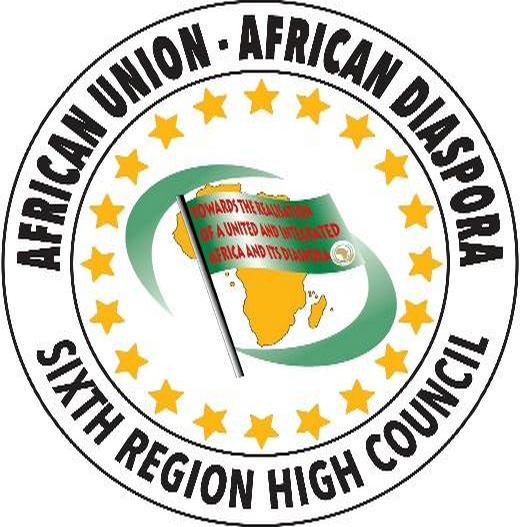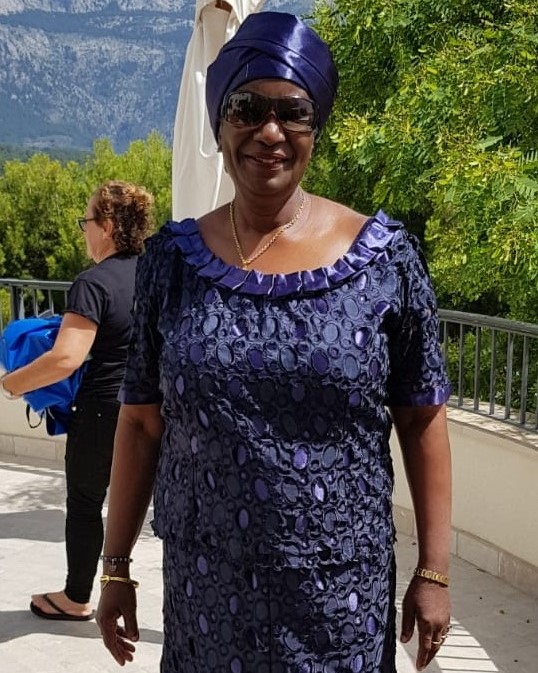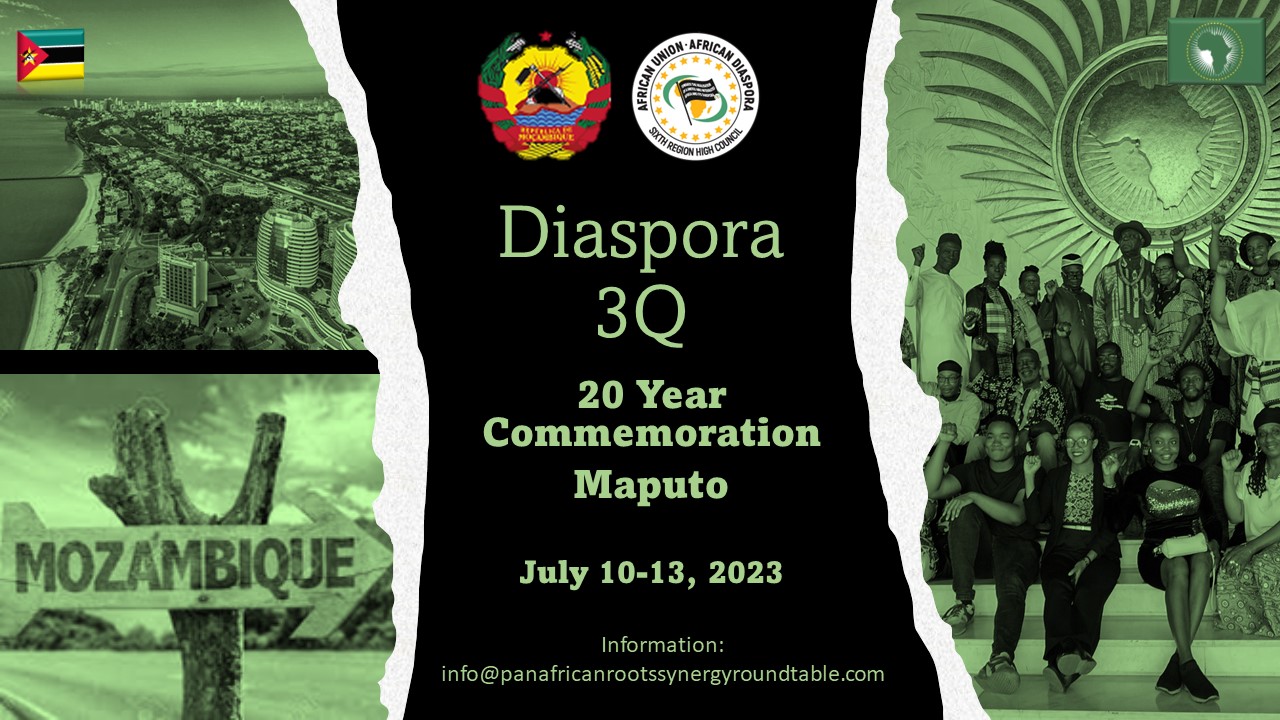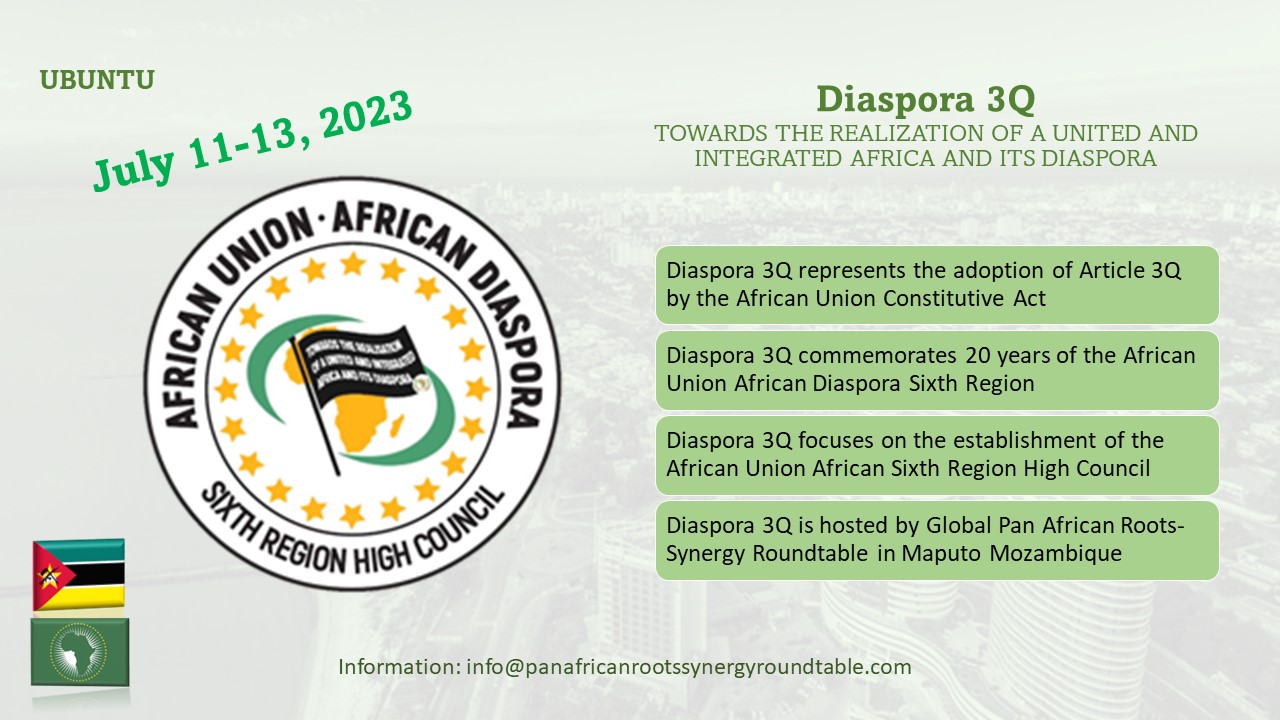CALL TO THE GLOBAL PAN AFRICAN ROOTS-SYNERGY MAPUTO ROUNDTABLE
COMMEMORATION & CELEBRATION OF THE 20th ANNIVERSARY OF THE ADOPTION OF ARTICLE 3Q OF THE AFRICAN UNION CONSTITUTIVE ACT
PREPARING TO ESTABLISH THE

10-13TH JULY 2023
MAPUTO MOZAMBIQUE
The Southern Sun Hotel,
Avenida Da Marginal, Maputo





COUNTDOWN TO OUR EVENT
THE CALL TO THE GLOBAL PAN AFRICAN, AFRICAN UNION AFRICAN DIASPORA ROUNDTABLE, 2023
More than 50 years ago -a full half century- Pan Africanists from around the world met in Dar-es-Salaam, Tanzania for the 6th Pan African Congress. This was an international gathering that pulled together advocates for every meaningful and sometimes ‘whimsical’ theory and visionary idea for how to help accelerate and complete the rest of the anti-colonial struggles to return African lands and resources to African people, and how to develop positive and effective governmental structures that would bind together the talents of the majority of African women, men and children to build the unified Africa that Africans deserve.
African Diasporans that attended, received a masterclass in the modern version of Pan African nationalism in all its dimensions, and recognized a valued place for themselves in that thrust forward. Despite the ideological and organizational challenges inherent in such a gathering, the 6th PAC successfully moved the aim of Pan Africanism closer to fruition. Out of the 6th PAC came the magnificent expansion of the anti-apartheid struggle, including the divestiture movement. The African Diaspora participated in this ultimately successful series of campaigns that brought down state racism in South Africa and in Rhodesia (Zimbabwe). There was also substantial Diaspora-help provided to militarize African Liberation activities.
Among many other efforts, the 7th PAC (1994) in Uganda, and the attempted 8th PACs (2014); in South Africa (2014) and Ghana (2015) occurred and added more Diasporan-fire to the drive to eradicate neo-colonialism, and build overall African success and resilience. And the struggle continues.
In the early years of the 21st century, in the death throes of the Organization of African Unity (OAU) and the building of the African Union (AU) took take its place in the next stage of building the Africa that Africans need., In a ground breaking move, the outgoing executive director of the OAU made a seconded motion to have the new African Union invite the African Diaspora to formally join the AU effort to move Africa forward. The motion passed handily.
The African Union Diaspora proposal was officially announced in February 2003. The African Union, via its Constitutive Act (AU Constitution) amendment 3q, invites and encourages the full participation of the African Diaspora as an important part of the African continent, in the building of the African Union. In that context and in order to ensure that the Diaspora understands the invitation, the AU defined the Diaspora as, people of African origin living outside the continent, irrespective of their citizenship and nationality and who are willing to contribute to the development of the continent and the building of the African Union.
During the 2nd ordinary session of the African Union General assembly on July 11th 2003 in Maputo Mozambique, Article 3q of the African Union Constitutive Act was formally adopted.
Later in July 2004, the AU Heads of State voted to authorize the Economic, Social & Cultural Council (ECOSOCC) to provide an opportunity for African Civil Society Organizations (CSOs) to play an active role in contributing to the AU’s principles, policies, and programs. It was decided that 20 Diaspora Representatives be brought into the AU as members of ECOSOCC.
Many Africans in the Diaspora, including Pan Africanists, other civil society activists and those who had already joined the ‘Ancestors-Council’, had been working and waiting for decades for the pivotal moment in 2003 for the adoption of the Article 3q.
In January 2006 in Khartoum, Sudan, the AU endorsed South Africa as the host of the second African Caribbean Diaspora Conference (decision 269). Pursuant to the implementation of this mandate to South Africa, the AU in consultation with the AU Commission, decided on a three-phased approach. Consultations via Regional Consultative Conferences (RCC’s), the Ministerial Conference and the AU Head of States Summit.
The three main objectives of the AU Head of States Summit were:
- Create sustainable partnership between the AfricanDiaspora and the African Continent through a realizable Program of Action;
- Create sustainable dialogue and strengthen Pan Afrikan solidarity for a better Africa and its Diaspora;
- Promote South-South cooperation in the betterment of the African Continent and its Diaspora.
Follow up to the aforementioned South Africa three phased approach, and as preparation for the South Africa Ministerial Conference that took place in November 2007 16-18, RCC’s under the umbrella of the South African Government were organized in:
- Latin America (Brazil)
- United Kingdom (London)
- North America (New York)
- The Caribbean (Barbados)
- Europe (Paris)
The main purpose of the RCC’s was to engage in a global consultative dialogue with civil society and governments of the African Diaspora in preparation for the AU African Diaspora Ministerial Conference followed by Senior Officials & Ministerial Conference in Johannesburg with the purpose to develop a Draft Program of Action. Participants discussed the Outcomes of the RCC’s and articulated recommendations regarding political, economic and social challenges facing Africa and its Diaspora, resulting in the adoption of the African Union African Diaspora Declaration on May 25th 2012 during the African Union African Diaspora Summit held in (Sandton) Johannesburg, South Africa.
The developments since the RCC’s
At the same time during the start of the RCC process and immediately after the adoption of the AUADS-Declaration in 2012, organizations worldwide have actively started working to meet the expectations of the African Union. Coordinated, structured partnerships emerged in several regions of the Sixth Region (amongst them the SRDC, PADU, AUADS Facilitators Working Group Europe & MEADUC, Australia/Pacific Diaspora Celebration and AFRIDU). This with the aim:
- To mobilize, re-motivate and organize the Diaspora Community;
- To engage each other within the 6thRegions;
- To engage with the African Union via the respective African Diaspora Organs such as the Citizens and Diaspora Directorate (CIDO) & ECOSOCC.
Conclusion
The Global African Diaspora observation and experience is that twenty years later after the adoption of Article 3q and ten years later after the adoption of the AUADS-Declaration, African Diaspora are still not able, so to speak, to fully accept the aforementioned invitation from the African Union and build its participatory contribution to the AU’s mission.
The Statues of ECOSOCC, established to guide the establishment and the operations of the Permanent Civil Society Commission inside the African Union, including the membership from the Diaspora, called for 20 elected civil society members from the Diaspora alongside 130 continental African members. To date there are and have been no elected Diaspora members. This is despite many initiatives from the Diaspora in this area.
Analysis
- It has been noted that Article 3q of the Constitutive Act has not been ratified by the requisite percentage of AU members. However, that is an irrelevancy. Virtually all of the other amendments approved along with Article 3q (many of them not ratified either) have beenimplemented into regular AU operations. Regardless of the ratification issue, the AU has operated as if the Diaspora relationship is a faitaccompli, when it is clearly not. It is important that the AU Member States understand this. And this is an issue that we would like to discuss on how to support the African Union in the realization of the expected results.
- The AU designated the Diaspora’s participation to start in the AU’s ECOSOCC Commission. There was a guide prepared and approved by the AU to instruct those interested in how to achieve that participation called the Statues of ECOSOCC. In Article 3(3), those Statutesstate, “ECOSOCC shall also include social and professional groups in the African Diaspora organizations in accordance with the definition (of the Diaspora) approved by the Executive Council.”
In Article 5 (3), it is stated that African Diaspora organizations shall establish an appropriate process for determining modalities for elections and elect twenty (20) CSOs (civil society organizations) to the ECOSOCC General Assembly. CIDO, the executive body assigned by the AU to manage Diaspora relations, has, for over 13 years, not implemented the ECOSOCC instruction yet.
Diaspora organizations which have offered such modalities have been routinely ignored or rebuffed, and all requests for a Technical Workshop sponsored by ECOSOCC or CIDO to arrive at an AU-approved method of electing Diaspora CSOs to ECOSOCC have gone unheeded. For a couple of years now, CIDO has been informing those who ask constantly that the legal and political framework is finished and ready to adopt. This is an issue that we would like to discuss on how to support ECOSOCC & the CIDO in the realization of the frameworks. It is important that we agree in an Ubuntu Connected Manner forward approach. Now it has come to our attention that a consultant has been appointed by the African Union Commission to engage with Diaspora Stakeholders. The Maputo Roundtable is an excellent opportunity to know more about the process from these African Union Commission organs. They have already been invited to accompany us in Maputo.
- There is a prevailing, mistaken view among a few thousand Diasporans already interested in this process that the Diaspora that has been invited by the African Union are essentially the “modern” Diasporas - those recent migrants from African countries to North America, Central America, South America, the Caribbean, Europe, Australia, Asia Pacific Oceania, etc., rather than the “historical” Diaspora - those descendants of victims of the trans-Atlantic, Arab, and Oceanic slave trades in captive Africans. That rumor has been allowed to fester and grow within many Diaspora communities, and there have already been too many internet comments, meetings, and conferences which have promoted this falsehood, with little attention being paid to correct it. Thus, a toxic rivalry now exists between various groups within the few thousand Diasporans already committed to the AU-Diaspora process because of this misunderstanding, and it has negatively affected the further development of that AU-Diaspora relationship.
Furthermore, it has fostered xenophobic behavior towards the historic Diaspora living and working on the African continent. This is in conflict with basic African tenets that govern hospitality, the Droit de Retour of the historic Diaspora and it adversely impacts human development. Furthermore, it violates the overarching principles of the DDPA’s International Decade for People of African Descent 2015-2024, whose theme Recognition, Justice, and Development by failing to recognize the historic African in the Diaspora, blocking our paths to justice, and thwarting our ability to contribute to the development of Motherland Africa. We must not be played off against each other and that is precisely the importance of the Maputo Roundtable to dialogue with each other about this unruly affair.
- The vast majority of the African Diaspora do not feel that they have any meaningful stake in building the AU-Diaspora relationship. What can or will such a relationship do to stop police shootings of unarmed African Americans for instance, or daily forms of multiple racism (Afrophobia) racial discrimination in Canada, or continued government seizure of citizenship homes and property in Central America, or the annual celebrations of ‘Zwarte Piet’ in the Netherlands? The political lack of will in the Western World to implement the Durban Declaration and Program of Actionand the International UN Decade of People of African Descent 2015-2024. CIDO hosted several meetings with support of the UN Office of the High Commissioner on Human Rights to bring awareness to the AU member states. And of course, a well-laid out and marketed information campaign can correct that situation. This is an issue that we would like to discuss on how to support the African Union governments and the AU Commission on Human and Peoples right in the realization of a successful campaign to bring more awareness to the United Nations Members States related to the full implementation of the DDPA and the International Decade. But also, how to engage with the UN Permanent Forum on People of African Descentand all other UN mechanisms that are in favor of People of African Descent.
- We repeat: the AU didinvite and encourage the African Diaspora to participate in the building and development of the African continent. As the main constituents of the Diaspora Division are the African Diaspora, and the African Union defines the African Diaspora as "Consisting of people of African origin living outside the continent...” Its constitutive act declares that it shall "invite and encourage the full participation of the African Diaspora as an important part of our continent, in the building of the African Union."
This invitation has not been rescinded and indeed has been recalled repeatedly in AU documents, namely, the Statues of ECOSOCC, the mandate for the CIDO, the South African government-sponsored Diaspora’s Regional RCC, and the Accra Declaration, 2007, as examples. We accept the invitation and interpret it as the means for African descendants in the Diaspora to seek out and create opportunities for economic and social cooperative development in and with African people; help bring the collective Diaspora and its resources into the AU, to fully participate in the process of Pan African unification and sustainable development; among other things; establish a Forum for representation and the airing of Diaspora’s concerns on the world stage; and, install the 20 representatives at ECOSOCC as stated in the ECOSOCC Statutes.
Unfortunately, upon arrival, we find that the existing Diaspora Policies of the individual AU Member States, do not include full provisions for us to be granted - the unique immigration status, unrestricted stay, and adequate support to settle.
There are few viable, or no existing mechanisms in place that are suitable for our purpose of coming back to Africa, and/or for staying via the investment route.
There needs to be an all Africa policy for the African Descendants who are repatriating and those already domiciled in an African country.
This is an issue that we will address during the Maputo Roundtable with the aim to reach agreement on a ‘2023/2024 campaign regarding the Right to Return’.
In May 2022 on the occasion of the commemoration of the 10th anniversary of the African Union African Diaspora Declaration a Global Pan African Roots Synergy Roundtable, a self-supported and independent event was organized. The Roundtable was supported by interested Pan Africanists, Activists, Scientists and Scholars and brought together delegates from interested Civil Society Organizations (CSOs) from the Global African World together. The Roundtable was endorsed by CIDO & ECOSOCC leadership.
The main question on basis of the aforementioned analyses was:
- What have we achieved since May 25th2012?
- What more must be done?
- What worked and what did not work? Which strategies were successful, and which were not? Is there the need to be more specific in what the AU requires from the Diaspora and what the Diaspora expects from the AU?
- How can elements of the African Diaspora increase their operational unity and their joint efforts to help build African sustainability and strength?
- How does the issue of Right of Return/Dual Citizenship get addressed?
- How are the fulfillmentof the agreements valued in relation to the identified areas on Political, Economic and Social Cooperation?
This includes the implementation and Follow-up strategies on:
- POLITICAL COOPERATION
- Intergovernmental Cooperation
- Mobilization of Support
- ECONOMIC COOPERATION
- Government Action to Foster Increased Economic Partnership
- Mobilization of Capital
- Partnership in Business
- Science and Technology
- Knowledge Transfer and Skills Mobilization
- Infrastructural Development
- Information Gathering and Dissemination Capacity
III. SOCIAL COOPERATION
- Knowledge and Education
- Arts and Culture
- Media and Image Building
- Immigration
- Social and Cultural Issues
The achievements:
A Resolution and Declaration was adopted. A formal response from the African Union Commission, the African Commission on Peoples and Human Rights in context with the send documents has not received yet. It is no exaggeration when it is counted that there is insufficient awareness among AU officials about the meaning of Article 3q of the AU Constitutive Act. And that that is apparently the reason that there is no adequate response to initiatives and correlates of Diaspora organizations and stakeholders.
In 2019 on the occasion of the African Diaspora Ghana Year of Return during a Pan African RootsSynergy-Roundtable-ACCRA-Declaration was adopted including an agreement for the realization a of a Decade of Return. Subsequently, the President of TOGO was mandated by the AU Head of States to study the proposals and issue a Report. In the meantime, the TOGO Report has been published without consulting the proposers.
See here a good example or insufficient awareness about the meaning of Article 3q.
The Maputo Roundtable provides an excellent opportunity for the TOGO responsible officials to meet and consult the Diaspora delegations.
Motives for a United Ubuntu Approach
We must try even harder to show in a united and integrated matter that we take the invitation that has come out the Article 3q of the African Union Constitutive Act very seriously. And this is the intent of the Maputo Roundtable in Mozambique. A Roundtable in which we intend to involve more partners than we had a year ago. The aim is to put the much-needed Unity into practice. The African Diaspora Development Institute and the Kingdom of Kush for example, have already joined our mission.
Mobilizing and supporting the African Diaspora is an important topic that requires a comprehensive discussion. Not in isolation or in a vacuum but in a coordinated, structured coherent strategic approach. And here we see the value to have as many entities on board; From South Africa for instance because of the fact that it is where it all started, CARICOM, BRAZIL and the EU and USA segments have to listen to the voices regarding the several Agreements that has been realized between these Nations and the African Union. There is so much wealth in Africa and yet the observation and experience is that wealth is not on our side and especially not on the side of the African Diaspora. We:
- Recognize the importance of participation of the entities concerned with the Reparatory Justice Narrative and the fight against Afrophobia as a consequence of trans-Atlantic chattel slavery and colonialism. There is an urgency of the adoption of specific & effective Global Mechanisms & Instruments to tackle this immense complicated area of concern.
At present, the experience is that the existing bureaucratic systems and mechanisms to address this global issue are not in favor of what we know must be realized.
- Are concerned and plan on engaging the European Union (EU) on matters the EU sponsoring of North African Nations, brutalizing Africans to discourage them of trying to cross the Mediterraneaninto Europe.
July, 11th 2023 will mark the 20th anniversary of the adoption of the Article 3q of the African Union Constitutive Act. The date marks the historic moment that the African Union via this Article 3q, officially invite and encourage the full participation of the African Diaspora as an important part of our continent, in the building of the African Union.
The High Council Facilitators believes that this Day in July 2023, - what we have identified as the ‘African Union African Diaspora Day’ -, should not pass by unnoticed. It marks an excellent opportunity to reflect on the developments so far on the implementation of the Agreements of the Global Pan African Roots-Synergy Roundtable (GPARSR) that was organized in Ethiopia, Addis Ababa from May 23-27, 2022, related to the commemoration of the 10th anniversary of the adoption of the Declaration of the Global African Diaspora Summit (DGADS) of May 2012. But it is also an opportunity to discuss new topics that came at the table after the adoption of the Addis Declarations.
We therefore invite all who want to be involved in this joyful fact of what 20th years of the Global African Diaspora adoption of Article 3q has brought to sustainable progress and prosperity development on the African continent and to the Global African Diaspora Communities everywhere where they are based.
The Maputo Program includes preparing for establishment of the African Union - African Diaspora Sixth Region High Council (AU-AD6RHC). The IDEA of the High Council emerged from an intensive process that started in 2006/2007.
Integration into the African Union
The AU-AD6RHC is a key governance structure established by the Global African Diaspora to facilitate their integration into the African Union and its member states. The High Council is based on:
- The "Leave no Community Behind Model" and seeks to ensure that all members of the African Diaspora are included in Africa's development.
- A Global (Sixth Region), Regional and National driven governance IDEA.
- The agreement during the Global Pan African Roots Synergy Roundtable, that was organized in Addis Ababa, Ethiopia from May 23-27, 2022 and related to the 10thanniversary of the adoption of the African Union African Diaspora Declaration May 2012.
Role, Position & Mission of the AU-AD6RHC
The AU-AD6RHC:
- Is an important platform for promoting the engagement of the African Diaspora in Africa's development. Its work is critical to ensuring that the African Diaspora is fully integrated into the African Union and its member states, and to fostering a sense of belonging and shared identity and common purpose among Africans, both on the continent and in the Diaspora.
- Plays a critical role in promoting collaboration and partnerships between the African Diaspora and African governments, institutions, and organizations.
- Provides strategic guidance and direction for the Africa Diaspora 6thRegion Project and the Development Agency, which work to mobilize the skills, knowledge, and resources of Africans living outside the continent to support Africa's development.
Mechanisms, Instruments & Objectives
One of the key priorities of the AU-AD6RHC is to support the creation of an African Diaspora Development Fund (ADDF), which would provide a sustainable and predictable source of financing for development initiatives led by the African Diasporas. The AADF will be managed by the Development Agency in Partnership with existing interested Global Institutes.
The overall objective of the Agency is to promote sustainable development and integration of all African communities, to reduce poverty, and to improve the quality of life for all people of African descent.
The Development Agency seeks to empower communities through project-development, resource mobilization, implementation, and monitoring. It will:
- Support a range of development activities, including infrastructure development, education and training, and entrepreneurship.
- Focused on promoting integration between the African continent and the Diaspora Communities, both ways.
- Engage in a range of activities to achieve its objectives. These includes:
- Project Development: The Agency will identify and develop sustainable projects that will promote the development of African communities. This will include projects in areas such as infrastructure, education, healthcare, and agriculture.
- Resource Mobilization: The Agency will mobilize resources from the African diaspora and other sources to support the development of African communities. This will include fundraising, grant writing, and other resource mobilization activities.
- Implementation: The Agency will oversee the implementation of development projects to ensure that they are delivered on time, within budget, and to the required quality standards. This will include project management, monitoring, and evaluation.
- Monitoring: The Agency will monitor the progress of development projects to ensure that they are achieving their objectives and having a positive impact on African communities. This will include regular reporting, data collection, and analysis.
- Action Plan:To achieve its objectives, the Agency will develop a comprehensive Action Plan that outlines specific goals, targets, and timelines. The Action Plan will be developed in consultation with stakeholders and will be regularly reviewed and updated to ensure its relevance and effectiveness.
- Launch July 11thas the African Union African Diaspora Day in commemoration of the 20th anniversary of the adoption of Article 3q of the African Union Constitutive Act. This includes the adoption of a Yearly Commemoration. A Day that should remind us of our connection with Mother Africa.
- Prepare the establishment of African Union African Diaspora High Council organization, the governing vehicle for the African Diaspora’s 6thRegion to liaise with the African Union and its member states. This includes the African Union African Diaspora Development Agency.
- Realize a United Africa and its Diaspora five Years Agenda for the integration of and implementing the objectives of the 6thRegion African Diaspora into the African Union and by all its member states.
The Roundtable shall provide analyses that appraises the collective needs in the several areas of African People and its Diaspora concerns such as:
- The Status of Developments in context with the Pan African RootsSynergy May 2022 Addis Ababa Agreements, Declaration and Resolution.
- The African Union Diaspora High Council, mobilizing, Organizing and Communication strategy with the African Union, the specific Organs, and Governments.
- The African Union Definition of the African Diaspora according to the vision African Diaspora High Council.
- Legal and Political Framework for the integration in the various Originated Organs of the African Union.
- The Human rights and fundamental freedoms of Africans in general and particularly the Fundamental Human rights of African peoples and the implementation of the UN Durban Declaration and Program of Action. In context with the UN International Decade for People of African Descent (2015-2024), respective the UN Permanent Forum on People of African Descent.
- Adoption of effective Mechanisms & Instruments and Legal Frameworks to manage the Global Case for Reparatory Justice, Repatriation in context with the Right to Return objectives.
- Reflection on the establishment of an African Union African Diaspora 6thRegion and Development Agency Project and with Global Diaspora Fund for Investment and Financing Global African Diaspora Projects (including small enterprises) and Continental Africa Stakeholders in General.
- All other topics mentioned while taken into consideration the Agenda 2063, Sustainable Development Goals and amongst Gender related Issues.
- The Role of African Traditional Leaders.
The Roundtable is scheduled for all interested Pan Africanists, Activists, Scientists, and Scholars and will bring together participants from interested CSOs from the Global African World, as well African Union, Caribbean, South & Central America Officials amongst others.
Business people and Investors.
The Roundtable will cover:
- Plenary Sessions (Keynote addresses on the various Roundtable topics)
- Working Group Sessions & Panel discussions about the Way Forward Outcomes
- Drafting Committee on Agreements, Declarations and Resolution
The Roundtable will produce a Declaration, a Resolution and a Report which includes an analysis of the state of affairs per African Union Member State in the field of a Diaspora policy and agreements amongst others such as:
- The establishment of July 11thas the African Union African Diasporas Day and in connection with the African Diaspora Decade of Return.
- The establishment and implementation of the African Union African Diaspora 6thRegion High Council. This includes amongst others project, expertise, and community driven commissions & the African Union African Diaspora Development Agency.
- The establishment of an African Diaspora Task Force with the aim:
- The realization of the Integration of the African Diasporas into the respective African Union Organs as well as member states strategic institutions.
- The establishment of African Diaspora Diplomatic missions/facilitators in every AU member state.
- To actively support processes that lead to the integration of African Diaspora ambassadors as Permanent Representatives to the African Union and other plenipotentiaries of member states.
- The active support of processes that lead to the implementation of Honorary Consulates to non-diaspora-states with predominantly African Diaspora populations.
- To assist with the Establishment of A Global strategy in context with the Case for Reparatory Justice & Repatriation and to this effect: realize effective mechanisms, instruments, and legal frameworks to manage the Global Case for Reparatory Justice, Repatriation in context with the Right to Return objectives.

